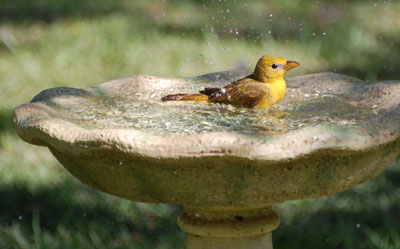Mother loves birds. Wild birds on PBS Nature specials. Tiny glistening, quivering Hummingbirds at the back yard feeder. Plain sparrows with their nest in the top leafy branches of the big apricot tree in the back yard. Fluttering and flouncing brilliant black Starlings that glitter emerald in the sun as they wash off their latest dirt bath in Mother’s birdbath, their gold beaks a bright beacon . Oh, she fusses about the dirt they leave behind, especially if she’s just cleaned up the bird bath and left it full of fresh water, but they’re birds and they’re welcome. She whispers to the Phoebes; coos at the Doves and click-clacks her tongue at the Wood Peckers.
She does not have the same affinity for feral cats. She treats them as interlopers who invade the bird space that is the back yard. She fusses like a mother hen when they slink across the grass to the birdbath, or when they lay in the shade of the apricot tree, their ears deaf to the warning of sparrows that screech in dismay. Anytime she sees one of those feral cats, Mother taps against the window or rushes out the door, sudden wings to her feet and cane, yelling to startle them into bolting to the fence where they squeeze under to safety.
I’ve gotten accustomed to Mother’s irritation at the cats and I’ve started chasing them away as well. Don’t get me wrong. I like cats. We usually had one in the house when I was growing up. What I don’t like is Mother’s stress and her fussing over the unwanted cats. And I figure if the cats are going to take it seriously that this yard is off limits, then the people that live in the house need to be unified in their feral cat approach, right?
I was rinsing dishes at the kitchen sink after lunch today when movement in the yard caught my attention. I looked out the window in time to see the younger black feral cat take a three foot leap into the birdbath. The entire event couldn’t have taken more than three seconds. He leapt, was coated with water that dripped off him and the sparrow in his jaws, steadied himself for a brief moment, then was down off the birdbath and headed across the yard towards the fence. Lickety-split.
“Hey!” I pulled the yellow rubber gloves off my hands and headed for the back door, my heart pounding. He was gone by the time I unlocked the door and got outside. The chirping from another sparrow at the top of the apricot tree sounded pitiful and mournful.
When I got back inside, Mother had come to the window above the kitchen sink.
“What were you chasing,” she asked? She had a Kleenex in one hand and with the other leaned on her cane and searched the yard for some sign of the disturbance. We’d been out to the doctor’s and then to the lab for blood work and she was still wearing nice green slacks and a flowered button down blouse, her hair combed perfectly, her lips the shade of coral.
The house was cool against the hot afternoon, the classical station played Mozart as if the entire world was tamed, with no animals or people dying anywhere. No drought in California or Texas or Oklahoma or Nevada; no famine in Sahel or Sudan; no Christian girls kidnapped in Nigeria; no political machinations at work in Ukraine; no terrorists released in exchange for a missing soldier who might or might not be a terrorist sympathizer himself, no estimated 200 million of the world’s people in slavery today.
“Nature at work,” I said and gave her the details.
“That’s probably a baby left in the nest or the mother who saw her baby taken,” she turned and clunked her cane back to the dining room.
For the next ten minutes I could still hear that remaining sparrow crying in the nest. My ears hurt and I had to tell myself to breathe in and out. This is life. This is the cycle of life. Nature had impacted that little family.
I forgot for a time there, in this air-conditioned, machine and technology propelled life that there’s very little we control. That a cat’s instinct is to eat birds, that mankind’s basest nature is to control and dominate, that our world doesn’t live in a bubble where we can determine the weather and eradicate drought.
What we can do is pay attention to each other, care for the weakest and take responsibility to rise above the worst that mankind can be. Reach to be the best we can be, and by God’s grace leave the world a better place than where we found it. I can do that. And, I can go on chasing feral cats out of the yard, knowing full well, if they don’t get a bird here, they’ll get one next door.

